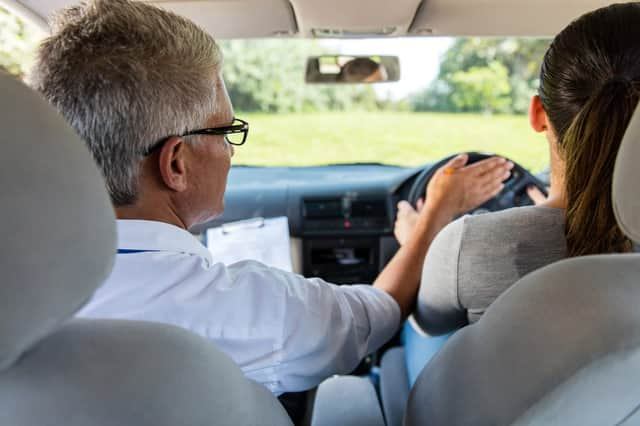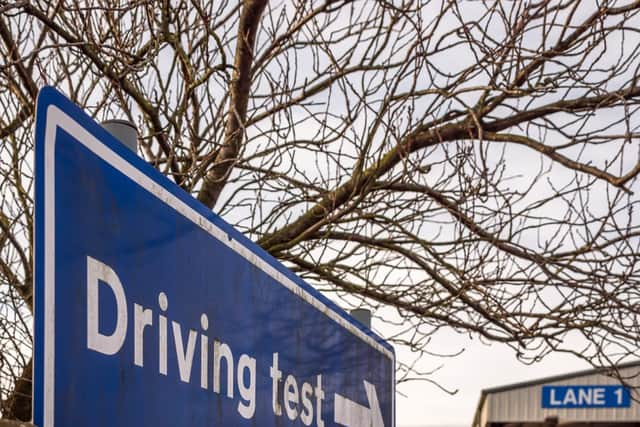When will driving tests resume in 2021? DVSA update on when theory and practical tests are starting again


The Driver and Vehicle Standards Agency has confirmed that learner drivers face a wait of at least six more weeks before they will be able to take a practical driving test.
The agency, which is responsible for driver training and testing, has confirmed the earliest date that tests can resume following the announcement of the Government’s roadmap out of lockdown.
Advertisement
Hide AdAdvertisement
Hide AdOn Monday, 22 February Prime Minister Boris Johnson announced a four-step route out of England’s current lockdown restrictions. Following that the DVSA has been working to establish a timetable for tests to resume and has now said that practical driving tests will restart on Thursday, 22 April.
Theory tests are scheduled to resume earlier - from Monday, 12 April.
The DVSA has said that these are the earliest date from which tests will resume but that it remains dependent on the roadmap progressing as planned and a government review of the situation on 5 April.
It also annouced that driving lessons will be allowed to resume 10 days earlier, on Monday, 12 April to allow learners to refresh their skills before sitting their test.
Advertisement
Hide AdAdvertisement
Hide AdLessons and practical and theory tests have been suspended in England since the start of the year, with thousands of learners forced to wait for their test to be rescheduled.
The DVSA previously announced that all tests booked up to and including12 April would be cancelled and the latest announcement extends that for at least six more weeks in England and beyond that in Scotland.
In Scotland, First Minister Nicola Sturgeon has announced plans to ease resrtrictions and move to a localised tiered system from 26 April. The DVSA has said testing in Scotland will not begin until an area moves to level 3 restrictions but the Scottish Government has confirmed that lessons will be allowed to resume from 26 April.
The agency has also confirmed that anyone with a test date up to 22 April will automatically be given a new test date. Anyone whose theory test was cancelled was told to rebook the test themselves.
Advertisement
Hide AdAdvertisement
Hide AdAfter the first lockdown the online booking service for practical tests struggled to cope as hundreds of thousands of people tried to secure an appointment. A similar surge is expected this time as desperate learners race to secure their licence.
Since the start of the first nationwide lockdown in March 2020, more than 400,000 learners have seen their driving tests postponed or cancelled, often more than once. This has created a massive backlog and led to calls for the DVSA to speed up the testing process.
New procedures during tests
When tests resume learners and examiners will have to follow guidelines designed to reduce the risk of infection.
All students will have to wear a face covering unless they have a legitimate reason not to. Examiners will also wear a face mask and may also use gloves and a disposable seat cover.
Advertisement
Hide AdAdvertisement
Hide AdLearners will be asked to arrive no more than five minutes before their test appointment.
The car must be cleaned and clear of any unnecessary items before the test and the examiner will carry out an additional clean of some areas.
One window on each side of the car must be kept open at all times to aid ventilation.
Some driving test centres will remain closed while others will have social distancing measures in place.
Advertisement
Hide AdAdvertisement
Hide Ad

Driving instructors will not be allowed to accompany students on the test and will only be able to listen to post-test feedback from the examiner if social distancing can be maintained.
The DVSA has yet to give a firm restart date for lessons but following the first lockdown lessons were allowed to restart two weeks before driving tests.
The planned resumption of driving tests is, like other elements of the roadmap out of lockdown, dependent on four key factors including the vaccine deployment programme continuing successfully, evidence that it is sufficiently effective, and infection rates remaining at a level that doesn’t put unsustainable pressure on the NHS.